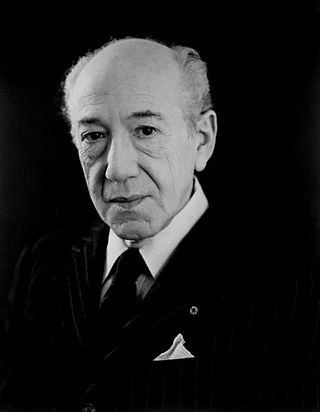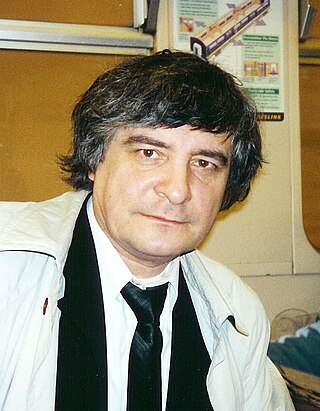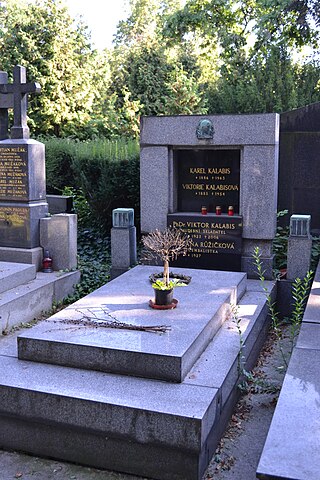
Vincent Ludwig Persichetti was an American composer, teacher, and pianist. An important musical educator and writer, he was known for his integration of various new ideas in musical composition into his own work and teaching, as well as for training many noted composers in composition at the Juilliard School.

David Leo Diamond was an American composer of classical music. He is considered one of the preeminent American composers of his generation. Many of his works are tonal or modestly modal. His early compositions are typically triadic, often with widely spaced harmonies, giving them a distinctly American tone, but some of his works are consciously French in style. His later style became more chromatic.

Alexander Nikolayevich Tcherepnin was a Russian-born composer and pianist.
Boris Alexandrovich Tchaikovsky, PAU, was a Soviet and Russian composer, born in Moscow, whose oeuvre includes orchestral works, chamber music and film music. He is considered as part of the second generation of Russian composers, following in the steps of Pyotr Ilyich Tchaikovsky and especially Mussorgsky.
Richard Danielpour is an American composer and academic, currently affiliated with the Curtis Institute of Music and the University of California, Los Angeles.
Bernard Rands is a British-American contemporary classical composer. He studied music and English literature at the University of Wales, Bangor, and composition with Pierre Boulez and Bruno Maderna in Darmstadt, Germany, and with Luigi Dallapiccola and Luciano Berio in Milan, Italy. He held residencies at Princeton University, the University of Illinois, and the University of York before emigrating to the United States in 1975; he became a U.S. citizen in 1983. In 1984, Rands's Canti del Sole, premiered by Paul Sperry, Zubin Mehta, and the New York Philharmonic, won the Pulitzer Prize for Music. He has since taught at the University of California, San Diego, the Juilliard School, Yale University, and Boston University. From 1988 to 2005 he taught at Harvard University, where he is Walter Bigelow Rosen Professor of Music Emeritus.

Augusta Read Thomas is an American composer and University Professor of Composition in the Department of Music at the University of Chicago, where she is also director of the Chicago Center for Contemporary Composition.

Dmitri Nikolaevich Smirnov was a Russian-British composer and academic teacher, who also published as Dmitri N. Smirnov and D. Smirnov-Sadovsky. He wrote operas, symphonies, string quartets and other chamber music, and vocal music from song to oratorio. Many of his works were inspired by the art of William Blake.
Boris Ivanovich Tishchenko was a Russian and Soviet composer and pianist.
Raymond Wilding-White ; was an American composer of contemporary classical music and electronic music, and a photographer/digital artist.

Behzad Ranjbaran is a Persian composer, known for his virtuosic concertos and colorful orchestral music. Ranjbaran's music draws from his cultural roots, incorporating Persian musical modes and rhythms.
Jukka Santeri Tiensuu is a Finnish contemporary classical composer, harpsichordist, pianist and conductor.
Stefans Grové was a South African composer. Before his death the following assessment was made of him: "He is regarded by many as Africa's greatest living composer, possesses one of the most distinctive compositional voices of our time".

Viktor Kalabis was a Czech composer, music editor, musicologist, and husband of harpsichordist Zuzana Růžičková.
Daniel Felsenfeld is a composer of contemporary classical music and a writer.
Alexander Mikhailovich Raskatov is a Russian composer.
Jeff Hamburg is an American composer. Born in Philadelphia, he studied acoustics and composition at the University of Illinois and moved to the Netherlands in 1978 to continue his studies at the Royal Conservatory of The Hague with Louis Andriessen. In 1986, he received the Conservatory Prize. He further studied French Horn at the Royal Conservatory and later conducted classes with David Porcelijn at the Conservatory of Utrecht.

David Serkin Ludwig is an American composer, teacher, and Dean of Music at The Juilliard School. His uncle was pianist Peter Serkin, his grandfather was the pianist Rudolf Serkin, and his great-grandfather was the violinist Adolf Busch. He holds positions and residencies with nearly two dozen orchestras and music festivals in the US and abroad. His choral work, The New Colossus, was performed at the 2013 presidential inauguration of Barack Obama.
John Clement Adams is an American composer and educator.
Robert Sirota is an American classical music composer based in New York City and Searsmont, Maine. Sirota has written solo instrumental, vocal, chamber, orchestral, operatic, and liturgical works. He is the father of American violists Nadia Sirota and Jonah Sirota, and husband to organist and Episcopal priest Victoria Sirota. Dating back to 1994, Robert Sirota's work can be found on nine studio albums recorded by an assortment of musicians including: Dinosaur Annex Ensemble, the Chiara String Quartet, and the American String Quartet. Most recently, Sirota's 2020 work for cello and piano, Family Portraits, was recorded by the Fischer Duo for their album 2020 Visions, released on Navona Records on August 26, 2022.








